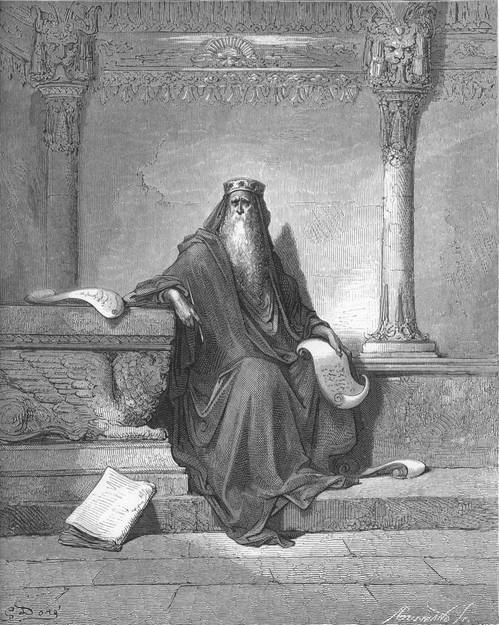"Chockmah" & Building a Life with God
Psalm 127 - 3 minute read
"Unless the LORD builds it, those who build it labor in vain."
If you are building a life for yourself motivated by intentions apart from God's, it’s empty. Using wisdom — trusting in God's design for human flourishing — is foundational to building a fruitful life with Him.
Psalm 127 is written by David’s son, Solomon. But why does Solomon have the authority to tell us about how to build a life with God?
In 1 Kings, after David dies, Solomon inherits the throne. And right at the start of his reign, God appears to him in a dream and essentially says, “Ask for whatever you want, and I will give it to you.” Immediately, Solomon takes a posture of humility and gratitude, setting himself as a “little child” in front of God. Famously, Solomon asks God for a heart with the ability to discern between right and wrong so that he can rule and govern God’s people on His behalf — "wisdom."
In 1 Kings, after David dies, Solomon inherits the throne. And right at the start of his reign, God appears to him in a dream and essentially says, “Ask for whatever you want, and I will give it to you.” Immediately, Solomon takes a posture of humility and gratitude, setting himself as a “little child” in front of God. Famously, Solomon asks God for a heart with the ability to discern between right and wrong so that he can rule and govern God’s people on His behalf — "wisdom."
What is biblical wisdom, and how do I use it?
The most common Hebrew word for wisdom, spelled with English letters, is chokhmah. It is an artisanal word for bending, subduing, and creating with the materials of knowledge. In other words, wisdom is like wielding understanding carefully and skillfully, like a tool, in order to craft a beautiful life for yourself.
Scripture shows us that 'the fear of the LORD," or trusting in God’s way of doing things, is the key to wisdom, and therefore necessary for building a truly beautiful life. Surrendering control and depending on God to guide your hands as you build is the foundational step to crafting a fruitful life with Him. Unfortunately, that's tricky for us. But we aren't alone.
When Solomon asks for wisdom, the Hebrew words for right and wrong (again, spelled with English letters) are tov and ra. These same words appear all throughout Scripture, but Genesis 2 is the first time they appear together and connected to the idea of wisdom and understanding. So, let's take a look how this story illustrates the wrong ways to approach gaining wisdom:
Scripture shows us that 'the fear of the LORD," or trusting in God’s way of doing things, is the key to wisdom, and therefore necessary for building a truly beautiful life. Surrendering control and depending on God to guide your hands as you build is the foundational step to crafting a fruitful life with Him. Unfortunately, that's tricky for us. But we aren't alone.
When Solomon asks for wisdom, the Hebrew words for right and wrong (again, spelled with English letters) are tov and ra. These same words appear all throughout Scripture, but Genesis 2 is the first time they appear together and connected to the idea of wisdom and understanding. So, let's take a look how this story illustrates the wrong ways to approach gaining wisdom:
"In the beginning..." God placed two trees in a beautiful Garden. One of the trees gives anyone who eats its fruit access to the life-giving energy of God. The other tree — a tree for understanding right and wrong, knowing between tov and ra, is dangerous — it leads to death. God places two humans in the Garden too, so they can rule and govern Creation on God's behalf, but He warns them to not take from the tree that leads to death.
Eventually they take the fruit for themselves, defining good and bad, tov and ra, in their own terms and for their own purposes, instead of building on God's way of doing things. Because of their lack of trust in God, the humans, Adam and Eve, are exiled from the Garden and cut off from the other tree — the one that leads to life.
A desire to know between good and bad wasn't Adam and Eve's mistake. After all, they were created to rule on God's behalf, and being able to discern between right and wrong is necessary for any good ruler. Adam and Eve's mistake was seeking wisdom apart from God. What Adam and Eve took for themselves, Solomon asked for and freely received. He chose the tree that leads to life, and used God's wisdom to build on a foundation of respect and trust in God's way of doing things.
Eventually they take the fruit for themselves, defining good and bad, tov and ra, in their own terms and for their own purposes, instead of building on God's way of doing things. Because of their lack of trust in God, the humans, Adam and Eve, are exiled from the Garden and cut off from the other tree — the one that leads to life.
A desire to know between good and bad wasn't Adam and Eve's mistake. After all, they were created to rule on God's behalf, and being able to discern between right and wrong is necessary for any good ruler. Adam and Eve's mistake was seeking wisdom apart from God. What Adam and Eve took for themselves, Solomon asked for and freely received. He chose the tree that leads to life, and used God's wisdom to build on a foundation of respect and trust in God's way of doing things.

